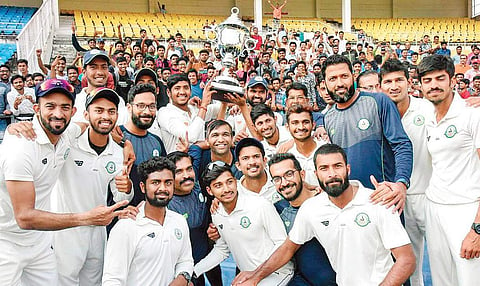

Test cricket has of late seen a couple of thrilling results that have forced sceptics to review their fear of its imminent demise. The West Indies’ series win against England at home and more significantly, Sri Lanka defeating South Africa in their territory is, in a manner of speaking, is a resounding victory for Test cricket, which thrives on unpredictability and surprising outcomes. At the same time, serious doubts remain — highlighted by a strange and mysterious decision that happened at home — over a domestic match. Ramifications of what transpired in the Irani Cup fixture involving Vidarbha and the Rest of India has found little space in the media and that is baffling.
The facts for those who did not follow the match, are that Vidarbha won on the basis of their first innings lead. What is surprising is that the Ranji Trophy champions were well on their way to an outright win, needing just 11 with five wickets in hand when the match was called off. There was enough time for those runs to be scored, though the game was in its final hour. The decision, which involved consensus from both the captains, was within the rules of the game.
The rules stipulate that a game can be called off, if the mandatory overs on the final day are on, if both captains desire so. This provision is there to stop play in case the final hour is headed for a boring draw with no bearing on the outcome of the match. In this match, the outcome was not in doubt as Vidarbha had already taken the first innings lead, which had ensured them the trophy, but the question remains: Why would a team not want to win a match outright and just be happy with first innings lead? The win was well within their grasp, just 11 needed and enough overs left, yet they decided to call off the game! What is very revealing of the preferences of the team is that they were willing to play for the sake of an individual who was nearing a ton and not for a win.
The moment Ganesh Satish got out on 87, Vidarbha agreed to call off the match. The explanation was that they were only waiting for him to complete his hundred and when he got out, they felt there was no point in continuing the match. Some reports which raised the red flag, suggested that the two captains, Ajinkya Rahane and Faiz Fazal of Vidarbha took the decision jointly and the umpires had to go by the rule book.
These reports also mentioned that the umpires did feel, although it was all within the laws of the game, it was an unethical decision. We can speculate what could have prompted this decision, the most obvious bei n g t h a t what mattered to Vidarbha was winning the t r o p h y, which their first innings lead had ensured. They did not want to waste one more hour, even if it would have secured an outright win.
You can draw own conclusions whether this was the right attitude towards the game? Why would a team trade a draw for a win, even if the trophy is secure? Is this just a question of ethics or is there something more disturbing involved? It would appear that for the players, the significance of playing a five-day domestic match is just statistical, where a century is more important than winning. If so, then the Indian board should reconsider their schedules, attach more meaning to these matches for players to get more interested in them. Or was there an outside element, an unethical practice, influencing the decision of calling off play? The board needs to probe and answer these questions, as it impacts the wellbeing of the game, especially the longer format of which India captain